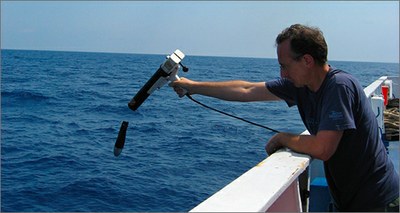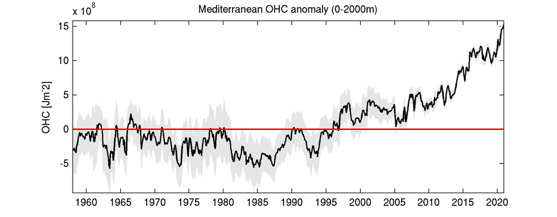Environment: Ocean temperatures at a record high - Mediterranean Sea the warmest and getting saltier
4/2/2021
 In 2020 ocean temperatures [1] hit record high with the Mediterranean basin recording both the highest salinity variation rate and warming rate, as reported by the first study on global ocean warming (updated with 2020 data) 'Upper Ocean Temperatures Hit Record High in 2020', conducted by an international science team including Italian researchers Franco Reseghetti of the ENEA S. Teresa Research Center and Simona Simoncelli of the National Institute of Geophysics and Volcanology (INGV) in Bologna.
In 2020 ocean temperatures [1] hit record high with the Mediterranean basin recording both the highest salinity variation rate and warming rate, as reported by the first study on global ocean warming (updated with 2020 data) 'Upper Ocean Temperatures Hit Record High in 2020', conducted by an international science team including Italian researchers Franco Reseghetti of the ENEA S. Teresa Research Center and Simona Simoncelli of the National Institute of Geophysics and Volcanology (INGV) in Bologna.
The study, published by the international journal “Advances in Atmospheric Sciences”, showed that the five warmest years ever recorded have all occurred since 2015, and each of the last nine decades was warmer than the previous one.
In 2020 the ocean layer between the surface and 2,000 meters deep absorbed 20 Zettajoules of heat (in the form of thermal energy) compared to the previous year, equivalent to the heat produced by 630 billion hair dryers operating day and night for a full year, over 10,000 times the total electricity consumption in Italy in 2019.
The thermal analysis carried out by two subgroups with two different methods also showed an increase in 2020 compared to 2019 (also a record year).
As regards "mare nostrum": “The Mediterranean is getting warmer and has become an ocean warming hotspot - Franco Reseghetti at ENEA said - As the attached graph shows, the phenomenon began in the late 1980s and, after a brief and illusory slowdown around the year 2000, accelerated rapidly, progressively involving deeper layers.
Measurements of the water column in the Ligurian and Tyrrhenian seas (which ENEA has been conducting since September 1999) have shown a progressive warming of the layer between 200 and 700m starting from the Sicilian coasts, a phenomenon which started propagating in the North in 2013. "
Both researchers pointed out that in the Mediterranean Sea also an increase in salinity was recorded at the same time: of all the basins analyzed, the Mediterranean shows the highest and most rapid variation, also due to its isolation (there is only one natural link with the Atlantic Ocean, the Strait of Gibraltar).
Global warming is easily explained- Simona Simoncelli at the INGV pointed out - over 90% of the heat is absorbed by marine waters so 'global warming' is nothing more than 'ocean warming', which, therefore, it is the best indicator of global warming. A few days ago the European Copernicus Climate Change service highlighted that 2020 and 2016 are the two hottest years on record (but in 2016 there was El Niño).
Moreover, a warmer sea means higher heat content that can be exchanged with the atmosphere, with increasingly severe effects clearly visible even on land.
It is worth remembering the water acidification increase due to the absorption of atmospheric CO2, which negatively impacts marine life, causing corals and organisms’ shells and skeletons to dissolve and affecting the life cycles of various living species.
What is worrying is not just the change, but the speed at which it occurs. Living species encounter great difficulties in adapting and evolving. ".

For more information:
Simona Simoncelli, INGV researcher: simona.simoncelli@ingv.it
Franco Reseghetti, ENEA researcher: franco.reseghetti@enea.it
"Upper Ocean Temperatures Hit Record High in 2020" published in the international journal "Advances in Atmospheric Sciences" https://link.springer.com/article/10.1007/s00376-021-0447-x
[1] Thermal energy present in the ocean in the form of heat (Ocean Heat Content)
